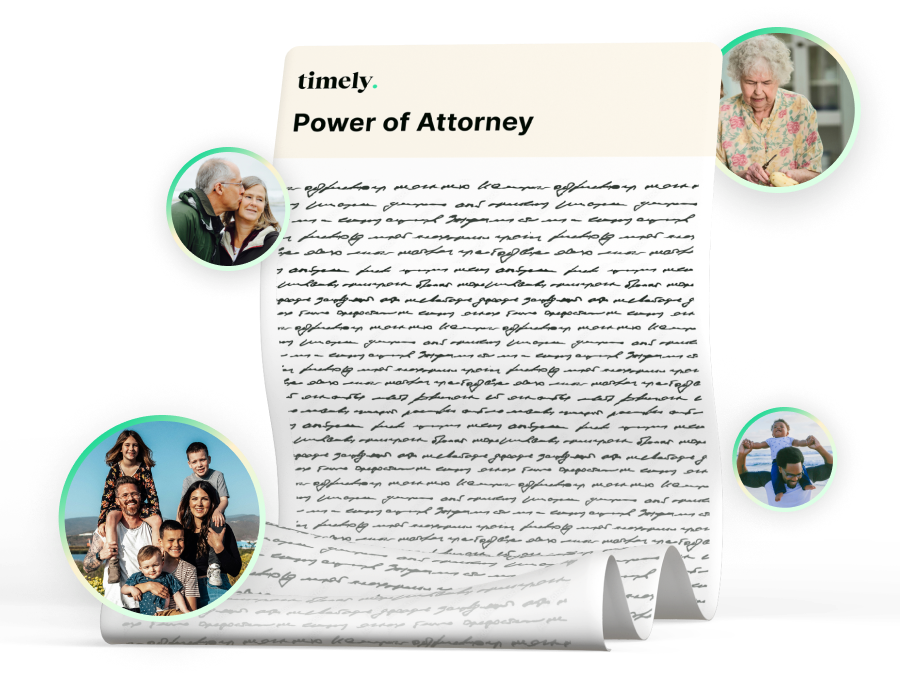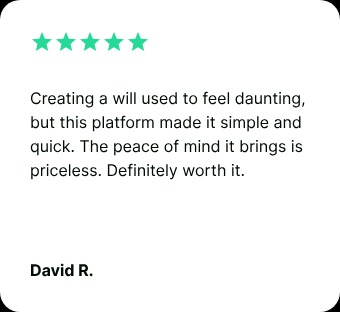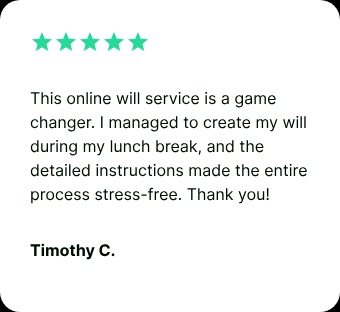Empower yourself
with Powers of Attorney.
Appoint the right people to handle your affairs when you're unable to. Gain peace of mind quickly and easily.

The quickest way to assign someone to manage your financial and healthcare decisions when you’re unable.
Healthcare Preferences
Provide advance instructions for your medical treatment and preferences.
Legal Responsibilities
Select a trusted individual to handle your legal matters.
Financial Management
Designate someone to oversee your property and finances.
Lifestyle Choices
Safeguard your lifestyle decisions, including your living arrangements.
Why choose Timely wills

Attorney Verified
Our wills are carefully crafted by US Attorneys, ensuring validity & acceptance in US courts.

Easy to Complete
We’ve simplified the tedious process of creating a Will & POAs, giving you the quickest way to get them done.

All 50 States
Each estate document is designed according to your state, giving you a state tailored solution.
Safe & Secure
Secure encryption protects your information and privacy while filling out these important documents.
Write your Power of Attorneys online with our online tool. Be proactive about your future by taking care of your POAs in timely manner.
$129
$199 for couples
- Financial Power of Attorney
- Healthcare directive
- HIPAA authorization
- Last Will & Testament included
- Update anytime
Appoint your
Powers of Attorney
Why is it important to have an Advance Healthcare Directive?
An Advance Healthcare Directive ensures your healthcare preferences are respected if you become unable to communicate them yourself. It provides guidance to your family and doctors, helping to avoid confusion and conflict during critical times.
What are the consequences of not having an Advance Healthcare Directive?
What are the consequences of not having an Advance Healthcare Directive?
What should be in an Advance Healthcare Directive?
An Advance Healthcare Directive should include your preferences for medical treatments, end-of-life care, organ donation, and the designation of a healthcare proxy to make decisions if you are unable.
What is the difference between a Living Will and an Advance Healthcare Directive?
A Living Will typically outlines your wishes regarding life-sustaining treatments, while an Advance Healthcare Directive includes your Living Will and may also designate a healthcare proxy to make decisions on your behalf.
Is an Advance Healthcare Directive legally binding?
Yes, an Advance Healthcare Directive is legally binding in most jurisdictions. It must be properly executed according to state laws to ensure it is recognized and followed.
Can doctors ignore an Advance Healthcare Directive?
Doctors are generally required to follow an Advance Healthcare Directive, but there may be exceptions in certain emergency situations or if the directive conflicts with hospital policies or ethical guidelines.
At what age should someone have an Advance Healthcare Directive?
It is advisable for all adults, regardless of age, to have an Advance Healthcare Directive. Unexpected medical situations can occur at any time, making it important for your wishes to be documented.
Does an Advance Healthcare Directive expire?
No, an Advance Healthcare Directive does not expire. However, it's recommended to review and update it periodically to ensure it reflects your current wishes and any changes in your health status.
Can I have a healthcare POA and an Advance Healthcare Directive?
Yes, you can have both a healthcare Power of Attorney (POA) and an Advance Healthcare Directive. The healthcare POA designates someone to make healthcare decisions for you, while the Advance Healthcare Directive provides specific instructions about your care.
Frequently Asked Questions About Health Care Directive.
Why should I consider creating a POA?
A Power of Attorney (POA) allows you to appoint someone you trust to manage your financial affairs if you become unable to do so. This ensures that your bills are paid, investments are managed, and other financial matters are handled according to your wishes.
Is it necessary to file a POA with the court?
Typically, a POA does not need to be filed with the court unless it is being used in a real estate transaction or if a specific state law requires it. However, it should be notarized to be legally effective.
What limitations apply to a Power of Attorney?
The limitations of a POA depend on the terms you set. You can grant broad or specific powers, but certain actions, such as altering your will, may be restricted. Always specify the extent of the authority in the document.
What duties does my agent or attorney-in-fact have?
Your agent, also known as an attorney-in-fact, has a fiduciary duty to act in your best interest, manage your assets prudently, avoid conflicts of interest, and keep accurate records of all transactions.
How does an ordinary Power of Attorney differ from a Durable Power of Attorney?
An ordinary POA becomes invalid if you become incapacitated, whereas a Durable POA remains in effect even if you are unable to make decisions for yourself. This distinction is crucial for long-term planning.
Who should hold the original POA document?
The original POA document should be kept by the person you appoint as your agent, with copies provided to relevant institutions such as banks and healthcare providers to ensure they recognize the agent's authority.
Can I still manage my finances after appointing a POA?
Yes, appointing a POA does not strip you of your ability to manage your own finances. The agent’s authority is concurrent with yours, meaning you can continue to act independently unless you specify otherwise.
Is it possible to assign multiple agents under a Power of Attorney?
Yes, you can appoint more than one agent to act jointly or separately. However, having multiple agents can sometimes lead to conflicts or delays, so it’s important to outline clear guidelines for decision-making.
Can a Power of Attorney be revoked or canceled?
Yes, you can revoke a POA at any time as long as you are mentally competent. This is done by creating a revocation document and notifying your agent and any institutions that were given a copy of the original POA.
Frequently Asked Questions About Financial Power of Attorney.









